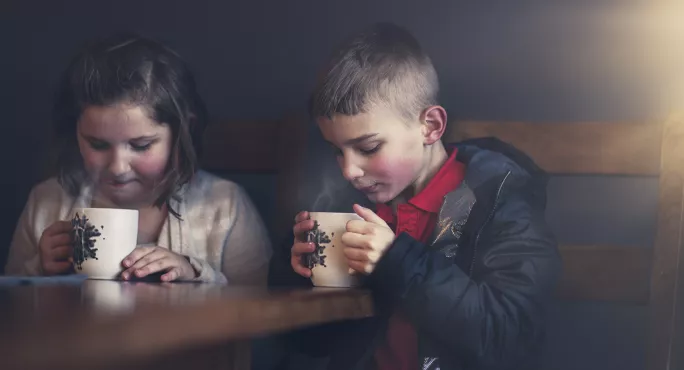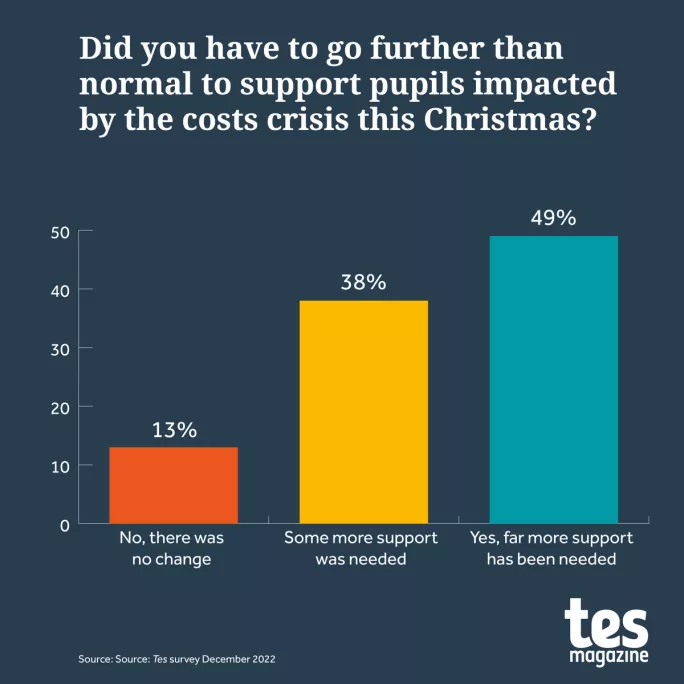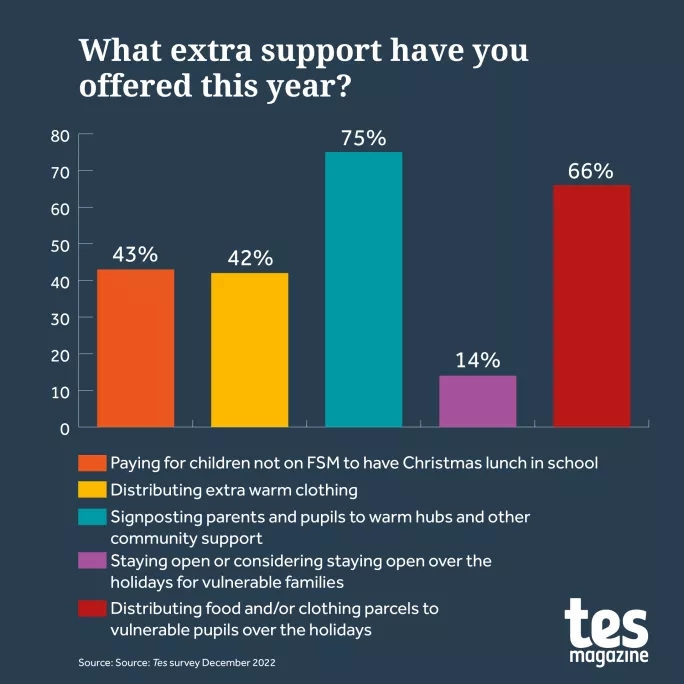Revealed: How schools have tried to save Christmas

Distributing Christmas presents, airbeds and food hampers are among the extra steps schools have had to take this year to support pupils and staff facing a festive season blighted by the cost-of-living crisis, Tes has learned.
The vast majority of school leaders, teachers and staff who responded to a snapshot Tes survey said their school has had to go further this Christmas to support a wider number of vulnerable pupils and struggling staff living in conditions described by one head as “disgraceful”.
Staff told Tes they were seeing a rise in the number of pupils stealing food, with one respondent saying they had ”more and more families living in the dark because they can’t even afford light bulbs”.
One staff member told Tes that they had to ”buy airbeds for some students” this year and “make more food bank referrals than ever before for staff and students”.
Nearly nine in 10 (87 per cent) of teachers, leaders and other school staff who responded to the Tes survey said their school had to go further than normal to support pupils impacted by the costs crisis this Christmas.
Of these, almost half (49 per cent) said far more support had been needed, while 38 per cent said some more support had been necessary.
- Investigation: ‘Vulnerable’ schools miss out on essential repairs cash
- Public First: More teachers buying pupils clothes and food
- Autumn statement: Schools face ‘large squeeze’ despite extra funding, IFS warns
Survey respondents based in schools in the North East and the East of England were the most likely to say their schools were having to go further than normal, with 95 per cent of school leaders and staff from those regions saying they had to do more to support pupils this year.
However, this trend was high across all regions in England.
Three-quarters of respondents (75 per cent) also said they have signposted parents and pupils to warm hubs and other forms of community support this year.
Two-thirds (66 per cent) are distributing food and/or clothing parcels to vulnerable pupils over the holidays, while 14 per cent said their schools are staying open or considering staying open over the holidays for vulnerable families.
Respondents also said housing had been a huge issue for families and had taken up a lot of school safeguarding teams’ time.

Meanwhile, more than four in ten said they had distributed extra warm clothing (42 per cent) and paid for children not on free school meals to have Christmas lunch in school (43 per cent).
Despite the financial pressure schools have been under, almost half (47 per cent) of respondents said they had managed to maintain normal festive activities.
One headteacher told Tes that, last Monday, their school had a Christmas dinner that was “free for everyone”, funded by donations and the school fund.
However, a further 44 per cent said the financial pressure on budgets did impact the Christmas activities, meaning they had been forced to take a “no-frills” approach to festive celebrations in school this year.
Meanwhile, almost one in 10 (9 per cent) said they had to cut Christmas-related events completely.
Impact on staff wellbeing
Respondents to the survey also warned they are concerned about the impact of the crisis on staff mental health.
Almost seven in ten (68 per cent) said their senior leadership team had to do more to support staff this Christmas.
One respondent said that the teaching staff at their school are “very often off with the amount of pressure they are under and mental health issues”.
Another said their senior leadership team had taken on extra workload to support teaching and other support staff’s mental health this year.
Vic Goddard, principal at Passmores Academy in Essex, said over 100 hampers will be delivered to families this year “with some treats of the season” but also basics such as pasta and soup.
At Passmores, some staff will also receive the hampers this year.
The funding for the hampers will come from staff donations and a charity formed by the academy called No Child Without, he said.
He added that the “fact this is a necessity is shocking”.
Mr Goddard said: “When we were open during the recent snow, I had parents thanking me for giving somewhere for their children to be warm.
“We need our politicians to stop trying to win the ‘media game’ with the strikes, etc, and to actually realise the impact of the catastrophic budget and their policies on the poorest in the country.”

Glyn Potts, headteacher at Blessed John Henry Newman RC College in Oldham, said his school had set up “a system of reverse advent calendar this year”.
This meant that the school collected food and tins for Oldham Foodbank over the build-up to the Christmas period.
Mr Potts said the school has ensured ”all of our parents and children have been made aware of where the warm hubs are across Oldham, including access to the sports facilities”.
He added: “All sports facilities in Oldham are offering free hot showers. You don’t need to be playing sport to go in and use them, which, for some of our children and families, will be absolutely critical.”
Mr Potts said his school is also allowing children and staff to take food home at the end of the day: “Any items that, when we get to a Friday, have been opened, like tinned food, big catering tins, we will go and give to the local food bank as well and any items that have been unused.
“So we’re just starting to try and make inroads in this to see how we can make a difference. But I think it’s going to be a long hard slog.”
Geoff Barton, general secretary of the Association of School and College Leaders, said: “Schools are doing all they can to support children through what are incredibly difficult circumstances this Christmas, whether that be through providing food and clothing themselves or passing on information about where families can go for further support.”
‘More must be done to tackle underlying causes of poverty’
Mr Barton said the current cost-of-living crisis had “compounded the issue” but “staff have had to become accustomed to providing necessities to pupils year round”.
He added: “Many members of staff are undoubtedly struggling themselves, having seen their pay fall in real terms by one-fifth since 2010.
“The extra support being provided is testament to the kind-hearted people working in the education system and the generous communities they serve, but the fact it is so necessary should be a source of great shame for the government.
“Far more must be done to tackle the underlying causes of poverty and create a more equitable society that allows everybody to thrive in education and beyond, no matter their background.”
Commenting on the Tes survey findings, Kevin Courtney, joint general secretary of the NEU teaching union, said schools “are at the frontier of a growing crisis of poverty”.
He said: “The school holidays are a difficult time for many families who rely on the incredible support schools provide during term time, and many will have to make sacrifices. We know that our members are taking extra steps to support those living in poverty.
“We are incredibly proud of our members who are going to extraordinary lengths to support their pupils, but they shouldn’t have to.
“The government must step up income and welfare support for families and invest in ending holiday hunger. They must also commit to offering free school meals to every child in primary school to put money back in parents’ pockets.”
Responding to a request for comment on the Tes survey findings, the government pointed to its announcement this week that it had confirmed next year’s funding of £200 million for the holiday activities and food programme offering support to pupils from low-income families.
The Department for Education said around 600,000 children had benefited from the scheme in the summer of 2022.
389 school staff responded to a survey run on the Tes magazine website between 16-21 December.
You need a Tes subscription to read this article
Subscribe now to read this article and get other subscriber-only content:
- Unlimited access to all Tes magazine content
- Exclusive subscriber-only stories
- Award-winning email newsletters
Already a subscriber? Log in
You need a subscription to read this article
Subscribe now to read this article and get other subscriber-only content, including:
- Unlimited access to all Tes magazine content
- Exclusive subscriber-only stories
- Award-winning email newsletters
topics in this article



